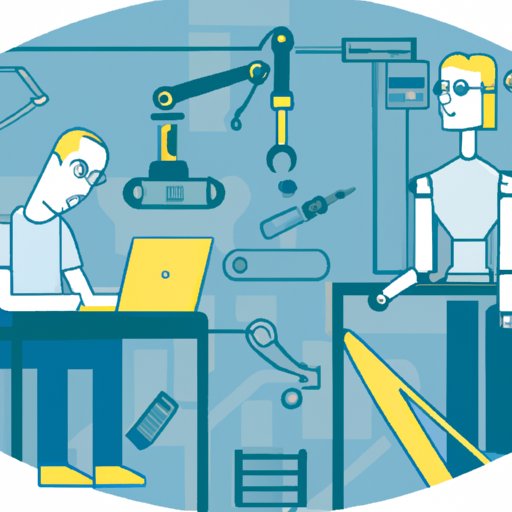Introduction
Computer manufacturing is a broad field that encompasses various industries involved in creating computer hardware and software. It’s a critical field that powers many corners of the economy, ranging from healthcare to finance, transportation, and communication. With the growth of technology and increased reliance on automation, computer manufacturing is an important subject to discuss. In this article, we’ll explore whether computer manufacturing is a good career path, its pros and cons, the future of the industry, required skills and specialization, tips for preparing and succeeding in a computer manufacturing career, success stories, and offer our final thoughts on the subject.
Pros and Cons of a Career in Computer Manufacturing
Before you decide whether a career in computer manufacturing is right for you, it’s essential to understand what it involves and the job opportunities available. Computer manufacturing is a broad field and can involve activities like designing, testing, assembling, and maintaining computer systems, as well as related software and peripheral equipment. You could work in a small manufacturing firm, a multinational computer hardware manufacturer, or as a computer systems analyst, among others.
Despite the positive outlook for computer manufacturing jobs, there are potential disadvantages to consider, including:
Job Stability
The computer manufacturing industry is not immune to economic downturns, and job security is particularly susceptible to fluctuations in demand for technology products. Consequently, some computer manufacturing jobs may be subject to layoffs during periods of economic recession. However, in general, job stability is strong in computer manufacturing due to wider reliance on technology in multiple industries.
Salary Prospects
The average salary for a computer hardware engineer in the United States is around $117,000 per year, while software developers can earn up to $105,000 annually. Additionally, senior positions such as Chief Technology Officer (CTO) or Vice President (VP) of Engineering earn significant salaries. However, salaries vary based on experience, specialty, and location. Therefore, we recommend that you research the salaries for the specific positions you are interested in before deciding on a career path.
Opportunities for Growth
As in many industries, upward mobility in computer manufacturing is dependent on your level of competence, performance, and experience. Job-specific training and continuing education are essential to advance in this field. Additionally, a robust job market with strong demand for new technology and innovative products provides ample opportunities for growth.

The Future of Computer Manufacturing Careers
The future of computer manufacturing jobs appears to be positive. As technology continues to transform industries and the workplace at an ever-increasing pace, the demand for skilled individuals focused on computer manufacturing continues to grow. With many forward-looking trends and new developments, there are opportunities in the industry for professionals with an eye toward future innovation.
One trend affecting the industry is the growth of artificial intelligence (AI), robotics, and automation to enhance production efficiency. Robotics, for example, already plays a significant role in tasks like assembling components, whereas AI technology is frequently used to reduce defects in manufacturing products. Additionally, computer manufacturing companies are investing in sustainability initiatives with the goal of reducing environmental impact, which creates opportunities for professionals in sustainable computer manufacturing.

Required Skills and Specializations for Careers in Computer Manufacturing
Computer manufacturing companies and employers look for individuals with technical and non-technical skills that align with their business goals and mission. Common qualifications for computer manufacturing jobs are a bachelor’s degree in computer engineering, computer science, electrical engineering, or a related field. Employers also value experience in programming languages, technical architecture, project management, and attention to detail. Moreover, certifications such as the Professional Engineer (PE) or the CompTIA A+ can increase your chances of landing a prominent computer manufacturing job.
How to Prepare for a Successful Computer Manufacturing Career
Success in computer manufacturing requires an emphasis on developing your skills in programming languages and other necessary areas. Additionally, you should strive to stay up-to-date with trends in the technology industry. It is crucial to seek experienced teams willing to mentor you and to look for internships and co-op work for hands-on experience.
Good communication skills are also beneficial. Collaboration will be necessary when working on various tasks, including product design, programming, and testing. Often, computer manufacturing jobs require teamwork to complete projects, so it’s crucial to work well with others and have good communication and collaboration skills.

Success Stories in Computer Manufacturing
The stories of successful professionals in computer manufacturing can be a source of inspiration and provide useful information for individuals interested in pursuing a career in this field.
One notable example is Bill Gates, who co-founded Microsoft, one of the most successful computer manufacturing companies. He has had an immense impact on the widespread adoption of personal computers. Another example is Kim Stevenson, who worked for IBM, where she became the CIO. She currently sits on boards, advises many startups, and is part of the Advisory Committee of the California Governors’ Initiative on Women in STEM. These success stories help underline the potential for individuals in the computer manufacturing industry to make meaningful contributions in their work.
Conclusion
In conclusion, the computer manufacturing industry is still a promising career field, both in terms of job stability and financial prospects. Still, it’s important to recognize that the industry demands workers competent in programming languages, technical architecture, project management, and more. With this knowledge, people considering such a career can identify the specific skills and education required. Ultimately, only you can determine whether a computer manufacturing career aligns with your professional goals and personality. So, don’t be afraid to do your research, and feel free to leverage the advice of experts in the computer manufacturing field to achieve success.
Is computer manufacturing a good career path? Based on the information provided in this article, computer manufacturing has a positive job outlook, strong salary prospects, and ample opportunities for growth. With the right skills and specialization, the industry presents a promising avenue for individuals passionate about computer technology and innovation.


